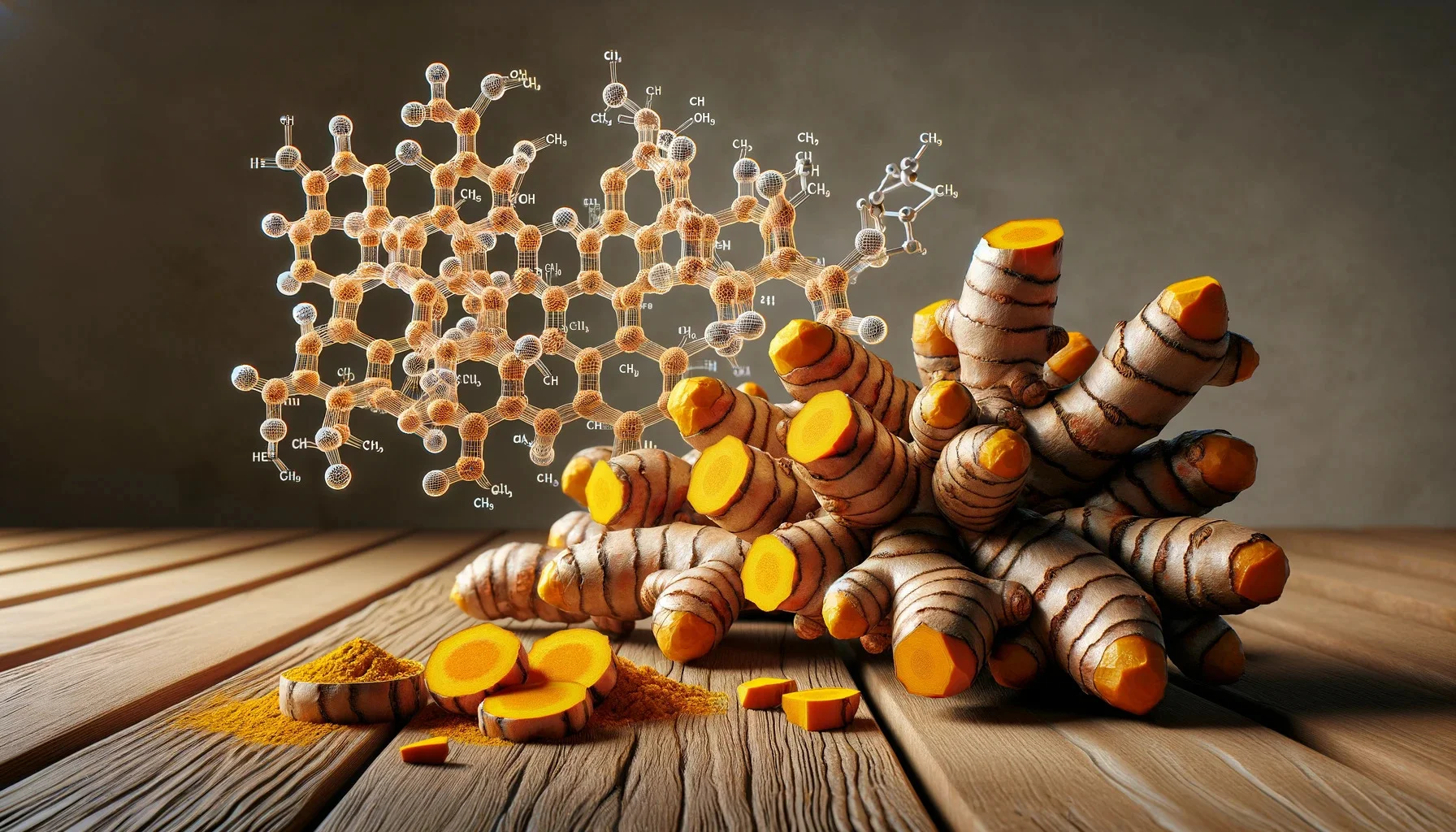
Turmeric (Curcuma longa) has been used for centuries in traditional medicine and cuisine.
Its primary active compound, curcumin (diferuloylmethane), has potent anti-inflammatory and antioxidant properties that support brain health and cognitive function.
Turmeric and curcumin have neuroprotective effects and may improve memory, attention, mood, and neurogenesis.
This article explores the science behind how turmeric benefits the brain.
Table of Contents
What is Turmeric?

Turmeric (Curcuma longa) is a spice derived from the rhizome of a plant in the ginger family (Zingiberaceae). It’s also known as turmeric, curcumin, Curcuma, Curcuma aromatica.
Native to Southeast Asia, this perennial herb has been used for centuries in Ayurvedic and traditional Chinese medicine.
The bright yellow-orange powder, known for its earthy, slightly bitter taste and musky aroma, is commonly used as a seasoning in curries and other dishes.
What Are the Bioactive Compounds in Turmeric?
The primary bioactive compounds in turmeric are curcuminoids, with curcumin (C21H20O6) being the most abundant and well-studied.
According to Hewlings & Kalman, curcumin makes up approximately 3-5% of turmeric by weight.(1)
Other curcuminoids include demethoxycurcumin and bisdemethoxycurcumin.
Turmeric also contains essential oils, such as turmerone, atlantone, and zingiberene, which contribute to its aroma and may have additional health benefits.

What Are the Cognitive Benefits of Tumeric?
Turmeric, particularly its main active compound curcumin, has been studied for its potential cognitive benefits:
| Cognitive Benefit | Mechanism of Action |
|---|---|
| Improved memory and attention | Modulation of neurotransmitters increased BDNF |
| Neuroprotection | Antioxidant and anti-inflammatory effects |
| Mood enhancement | Modulation of serotonin and dopamine |
| Increased neuroplasticity | Upregulation of BDNF |
How Does Turmeric Help Improve Memory and Attention?
Turmeric improves memory and attention by reducing inflammation, fighting oxidative stress, and increasing levels of brain-derived neurotrophic factor (BDNF).
A study found that curcumin improved spatial memory in rats by reducing oxidative damage and increasing BDNF expression in the hippocampus, a brain region critical for learning and memory.(2)
Curcumin also inhibits acetylcholinesterase, an enzyme that breaks down the neurotransmitter acetylcholine which is important for attention and memory.
How Does Turmeric Support Neuroprotection?
Turmeric supports neuroprotection through its anti-inflammatory, antioxidant, and anti-amyloid properties.
Chronic inflammation and oxidative stress contribute to neurodegenerative diseases like Alzheimer’s. Curcumin reduces inflammation by inhibiting pro-inflammatory cytokines and enzymes like COX-2.(3)
It’s a potent antioxidant that neutralizes free radicals and boosts the body’s own antioxidant enzymes.
Curcumin also binds to and helps clear beta-amyloid plaques, a hallmark of Alzheimer’s.
How Does Turmeric Contribute to Mood Enhancement?
Turmeric contributes to mood enhancement by modulating neurotransmitters like serotonin and dopamine.
Curcumin has been shown to have antidepressant effects in animal models of depression.
A study found that curcumin increased serotonin and dopamine levels in the brain, exhibiting antidepressant activity comparable to Prozac.(4)
Curcumin also reduces inflammatory cytokines like IL-6 and TNF-α that are elevated in depression.
How Does Turmeric Support Neurogenesis?
Turmeric supports neurogenesis, the growth of new brain cells, by increasing levels of neurotrophic factors like BDNF.
Curcumin has been found to enhance proliferation and differentiation of neural stem cells into neurons and glia.
A study showed that curcumin increased the number of newly generated cells in the dentate gyrus of the hippocampus, a key site of neurogenesis.(5)
By stimulating neurogenesis, turmeric helps preserve cognitive function and protect against age-related decline.
What is the Mechanism of Action of Turmeric?
Turmeric, and more specifically curcumin, exerts its nootropic effects through several mechanisms:
- Antioxidant activity: Curcumin is a potent antioxidant that can neutralize free radicals and reduce oxidative stress in the brain, which is associated with cognitive decline and neurodegenerative diseases.
- Anti-inflammatory properties: Chronic inflammation in the brain has been linked to impaired cognitive function and increased risk of neurological disorders. Curcumin has been shown to inhibit pro-inflammatory pathways, such as NF-κB and COX-2, and reduce levels of inflammatory cytokines.
- Modulation of neurotransmitters: Curcumin may influence the levels and activity of neurotransmitters involved in cognitive function, such as acetylcholine, serotonin, and dopamine.
- Increased BDNF: By upregulating BDNF, curcumin may promote neurogenesis, synaptic plasticity, and overall brain health, leading to improved cognitive performance.
What Are the Optimal Dosages of Turmeric?
The optimal dosage of turmeric for cognitive benefits varies depending on the form of supplementation and individual factors.
It’s important to note that turmeric supplements typically contain a higher concentration of curcumin compared to the spice itself.
For example, 1 teaspoon (3 grams) of ground turmeric contains approximately 150-200 mg of curcumin, while a 500 mg curcumin supplement may be equivalent to 25-50 grams of turmeric powder.
How Can the Bioavailability of Turmeric Be Improved?
One of the main challenges with turmeric supplementation is its low bioavailability.
When consumed orally, curcumin is poorly absorbed, rapidly metabolized, and quickly eliminated from the body.
However, several strategies can improve the bioavailability of turmeric:
- Consuming turmeric with black pepper: Piperine, a compound in black pepper, can increase curcumin absorption by up to 2000%.
- Combining turmeric with fat: Curcumin is fat-soluble, so consuming it with a source of healthy fat, such as coconut oil or olive oil, can enhance absorption.
- Using liposomal or nanoparticle formulations: These advanced delivery systems can improve the stability and absorption of curcumin.

Are There Any Side Effects or Precautions with Turmeric?
Turmeric is considered safe when consumed in amounts commonly found in food. However, high doses of turmeric supplements may cause some side effects:
- Digestive issues: Large doses of turmeric may cause gastrointestinal discomfort, such as nausea, diarrhea, and bloating.
- Blood thinning: Curcumin may have anticoagulant properties, which could increase the risk of bleeding, especially in people taking blood-thinning medications.
- Iron malabsorption: Curcumin may reduce the absorption of iron, which could be a concern for individuals with iron deficiency.
What Are the Potential Drug Interactions with Turmeric?
Turmeric may interact with certain medications, including:
- Blood thinners: Curcumin may enhance the effects of anti-coagulant and antiplatelet drugs, such as warfarin and aspirin, increasing the risk of bleeding.
- Diabetes medications: Turmeric may lower blood sugar levels, potentially leading to hypoglycemia when combined with diabetes medications.
- Chemotherapy drugs: Curcumin may interfere with the effectiveness of certain chemotherapy agents, such as doxorubicin and cyclophosphamide.
Who Should Avoid or Limit Turmeric Consumption?
While turmeric is safe, some individuals should avoid or limit its consumption:
- Pregnant women: High doses of turmeric supplements may stimulate the uterus and increase the risk of miscarriage.
- People with gallstones or bile duct obstruction: Curcumin may cause gallbladder contractions, which could exacerbate these conditions.
- Individuals with iron deficiency: As curcumin may reduce iron absorption, people with iron deficiency should monitor their iron levels when consuming turmeric.
How Can Turmeric Be Incorporated into a Nootropic Stack?
Turmeric can be combined with other nootropic supplements to create a synergistic cognitive-enhancing stack:
- Turmeric + Omega-3 fatty acids: Omega-3s, such as EPA and DHA, have neuroprotective and anti-inflammatory properties that may complement the effects of curcumin.
- Turmeric + Bacopa monnieri: Bacopa is an adaptogenic herb that has been shown to improve memory, attention, and cognitive processing speed. Combining it with turmeric may provide a multi-faceted approach to cognitive enhancement.
- Turmeric + Lion’s Mane mushroom: Lion’s Mane (Hericium erinaceus) is a medicinal mushroom that has been found to promote nerve growth factor (NGF) and improve cognitive function. Stacking it with turmeric may offer additional neuroprotective benefits.
What Are the Best Ways to Source and Store Turmeric?
When sourcing turmeric, it’s important to choose high-quality products from reputable suppliers.
For tumeric powder, look for brands that use organic, non-irradiated turmeric root. If using supplements, select products that have been third-party tested for purity and potency.
To maintain the freshness and potency of turmeric, store it in an airtight container in a cool, dark place.
Ground tumeric can last up to a year when stored properly, while fresh turmeric root should be used within a few weeks.
How to Select High-Quality Turmeric Products?
When choosing turmeric products, consider the following factors:
- Standardized curcumin content: Look for supplements that contain a standardized amount of curcumin, typically 95% curcuminoids.
- Bioavailability enhancements: Select products that include bioavailability-enhancing ingredients, such as piperine or lipids.
- Third-party testing: Choose brands that have their products independently tested for purity, potency, and contaminants.
- Organic certification: Opt for organic turmeric products to minimize exposure to pesticides and other harmful substances.
- Reputation and reviews: Research the brand’s reputation and read customer reviews to ensure the quality and effectiveness of their products.
- Hewlings, Susan J, and Douglas S Kalman. “Curcumin: A Review of Its Effects on Human Health.” Foods (Basel, Switzerland) vol. 6,10 92. 22 Oct. 2017, doi:10.3390/foods6100092↩
- Nam, Sung Min et al. “Effects of curcumin (Curcuma longa) on learning and spatial memory as well as cell proliferation and neuroblast differentiation in adult and aged mice by upregulating brain-derived neurotrophic factor and CREB signaling.” Journal of medicinal food vol. 17,6 (2014): 641-9. doi:10.1089/jmf.2013.2965↩
- Hu, Shuxin et al. “Clinical development of curcumin in neurodegenerative disease.” Expert review of neurotherapeutics vol. 15,6 (2015): 629-37. doi:10.1586/14737175.2015.1044981↩
- Kulkarni, Shrinivas K et al. “Antidepressant activity of curcumin: involvement of serotonin and dopamine system.” Psychopharmacology vol. 201,3 (2008): 435-42. doi:10.1007/s00213-008-1300-y↩
- Kim, So Jung et al. “Curcumin stimulates proliferation of embryonic neural progenitor cells and neurogenesis in the adult hippocampus.” The Journal of biological chemistry vol. 283,21 (2008): 14497-505. doi:10.1074/jbc.M708373200↩
